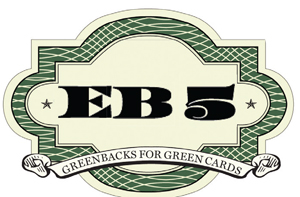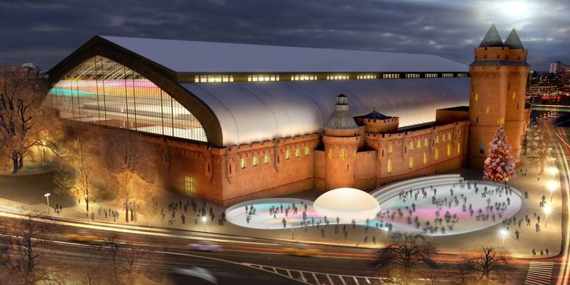 EB-5 investors by definition live outside the U.S., sometimes thousands of miles away. But it ultimately falls on them to determine which real estate development projects in NYC (or elsewhere in America) are safest to put their cash in. That can be a tough task since developers are trying to woo them and present their projects in the best possible light.
EB-5 investors by definition live outside the U.S., sometimes thousands of miles away. But it ultimately falls on them to determine which real estate development projects in NYC (or elsewhere in America) are safest to put their cash in. That can be a tough task since developers are trying to woo them and present their projects in the best possible light.
While many EB-5 projects get successfully finished, there are plenty of exceptions. Read on for a closer look at four New York projects that are facing problems while courting EB-5 cash.
Reinventing the wheel
The New York Wheel, a 630-foot-tall observation wheel currently under construction on Staten Island, successfully raised $150 million from EB-5 investors last year. But insiders now say that money could be in danger. That’s because the project has become embroiled in litigation and its projected costs have almost doubled to north of $500 million. In December, minority shareholder Eric Kaufman sued some of his fellow investors, including jeans mogul Joe Nakash and investor Lloyd Goldman, claiming the project had no coherent business plan and ineffective management. The wheel’s current revenue predictions — which were crucial in convincing EB-5 investors to opt in — are also wildly optimistic, critics say. In its first year of operation, it was projected to earn $15 million from admissions. But after jacking up the proposed price of a ride to $35 from $15, the developers are projecting $95.9 million in admissions fees. Wheel CEO Rich Marin attributed the cost overruns to construction. “We have been building this project in a robust New York City building environment where we compete for subcontractor and vendor services with many other large projects,” he said. “This has undoubtedly contributed to considerable cost escalation, just as it has for many other projects.”
‘Bau’ out?
Joseph Beninati of Bauhouse Group isn’t letting his bankruptcy situation stand in the way of his EB-5 capital raise. The developer says he still wants to raise $140 million for the firm’s 950-foot, 113-unit condo tower at 3 Sutton Place in Lower Manhattan later this year. In marketing documents circulated to potential crowdfunding investors for the project, the developer boasts that it has “approved ready-to-go EB-5 financing at a low 5.5% interest rate.” But Beninati defaulted on his $147.3 million loan and then, in January, filed for bankruptcy to prevent his lender, N. Richard Kalikow’s Gamma Real Estate, from foreclosing. The loan has a massively high interest rate of 30 percent. Whether Beninati’s financial woes prevent him from finding EB-5 investors for 3 Sutton remains to be seen.
On thin ice
Plans to turn the Kingsbridge Armory into a nine-rink ice skating complex may be skating on thin ice.
The $350 million Kingsbridge National Ice Center — which is relying heavily on EB-5 investment — has yet to line up the $158 million needed to complete its first phase. As a result, the city, which owns the property, put the ice center’s lease into escrow last year — a move designed to protect the taxpayers’ interests if the project falls through. The developer, Kevin Parker, had until late last month to raise the funds and keep the project moving forward. If the 750,000-square-foot complex does proceed, it will include rinks, a community center and a wellness center.

Kingsbridge Armory
According to a report by the Empire State Development Corp., the state’s economic development arm, the ice center is looking for EB-5 investors to chip in $250 million for a construction loan — a whopping 71 percent of the project’s total cost. (In most projects, EB-5 comprises less than 30 percent of the capital stack.)
But financing isn’t the only issue that’s dogged the project. In addition to partner infighting — three former partners unsuccessfully sued Parker in 2014, citing a lack of experience — the project has been slammed in the local press. In February, the Riverdale Press called it “ludicrous” to build a massive ice rink when a more modest rink at nearby Van Cortlandt Park shuttered.
Library lessons
David Kramer’s Hudson Companies is looking for $110 million in EB-5 money for its Brooklyn Heights library redevelopment, but the project has become a political hot potato. Critics have slammed the city, which owns the site, for awarding the development rights to Kramer — one of Mayor Bill de Blasio’s big backers — despite getting better offers. City Hall staunchly denies that characterization, saying Hudson put forward the best bid. The developer’s plans call for a new 36-story tower at 280 Cadman Plaza West, now known as 1 Clinton Street, as well as a revamp of the library. Hudson, which bid $52 million for the site, also has plans to build 114 affordable units, but at two off-site locations. Local residents filed a complaint with the Attorney General, alleging the library falsely claimed “capital poverty” in order to land a big payday in the form of a lucrative real estate deal.
Kramer called the controversy “absurd.”
The current library is a “big disappointment,” he said, adding that library advocates “have nothing better to do and think they’re on to the next Watergate.”
